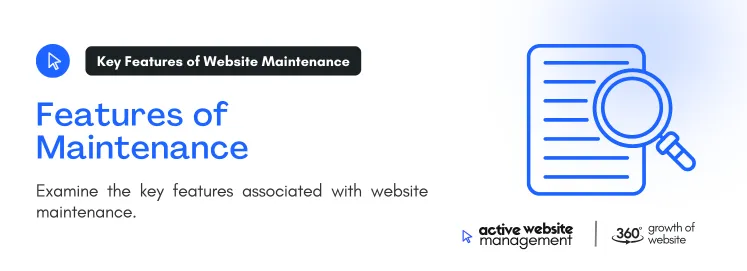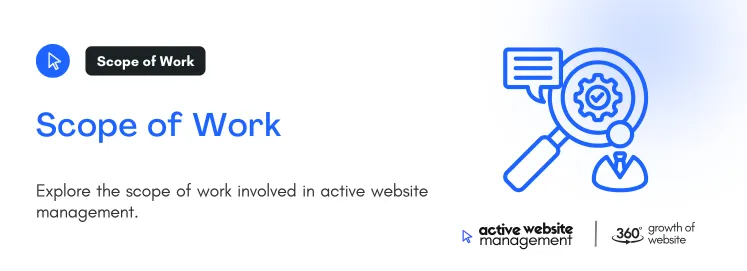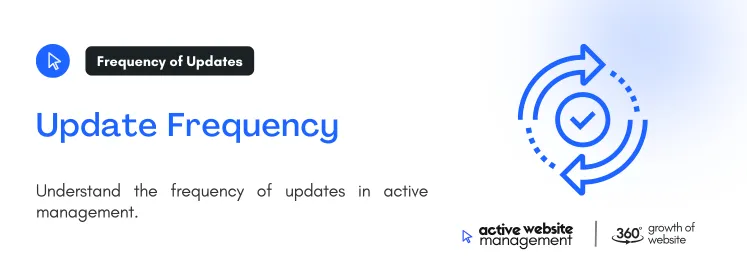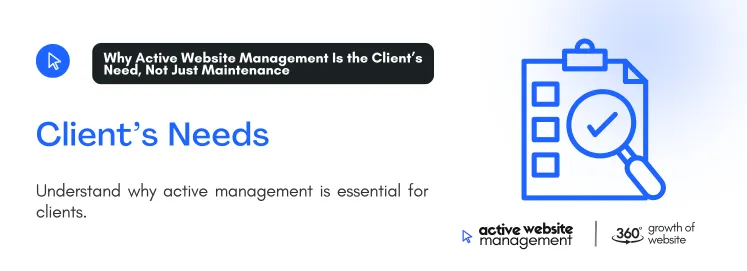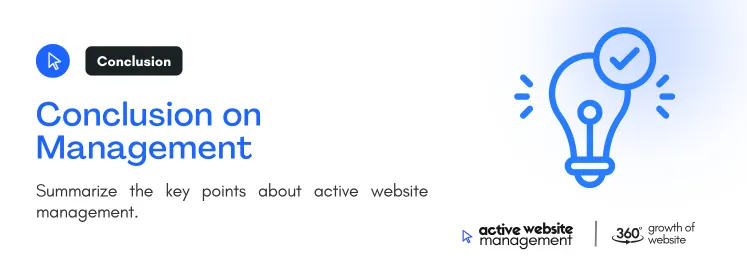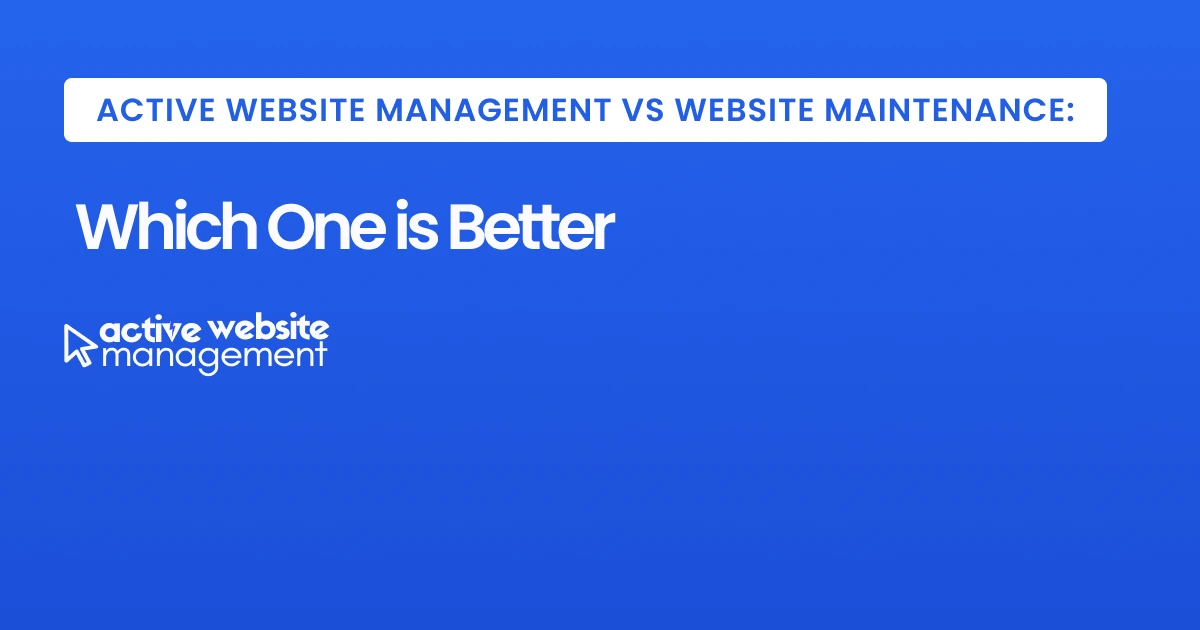
In today’s fast-paced digital world, having a website is not enough. The way you manage your website plays a huge role in the success of your business. While most people are familiar with website maintenance, there’s a newer, more comprehensive approach called Active Website Management that’s making waves. But what exactly is the difference between these two services? And why is Active Website Management the clear choice for businesses today?
In this article, we’ll explore what Active Website Management is, what Website Maintenance is, and then we’ll dive into the key differences that show why Active Website Management is not only beneficial but essential for modern businesses.
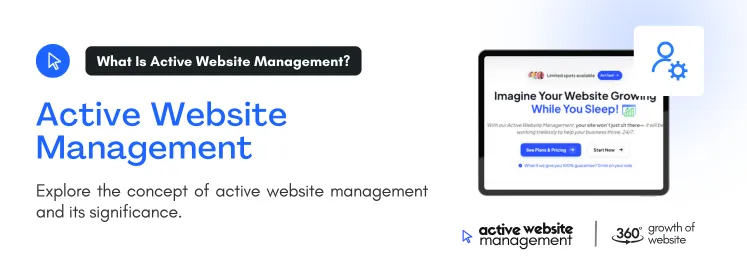
Active Website Management goes beyond the traditional definition of website maintenance. It is an ongoing, proactive service designed to not only keep your website running smoothly but to ensure that your website is constantly growing, improving, and aligned with your business goals. It’s a long-term, strategic partnership where the service provider becomes a part of your team, continually improving your site’s performance, design, content, and overall effectiveness.
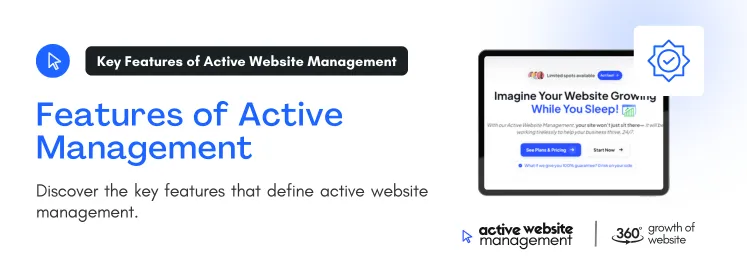
One of the standout features of Active Website Management is that your website is continuously updated. Whether it’s refreshing the content, redesigning elements, or improving your SEO, the goal is to ensure that your site evolves over time.
Don't Wait for Growth—Accelerate It with Active Website Management
Rather than just fixing things when they break, Active Website Management focuses on growth. It involves setting clear business goals and aligning your website strategy with those objectives. This could include creating new landing pages, improving conversion rates, or even developing new features that enhance user experience.
SEO is not a one-time task. Active Website Management ensures that your SEO is continually refined, optimized, and updated according to the latest search engine algorithms. Performance enhancements, such as improving load times and fixing broken links, also happen on a monthly basis.
Active Website Management focuses heavily on user experience. This includes ensuring your website is mobile-friendly, improving navigation, and making sure the design is intuitive and appealing to users.
Another critical component of Active Website Management is the use of data and analytics. Monthly reports are provided to show the performance of your site, highlighting areas of success and those that need further improvement.
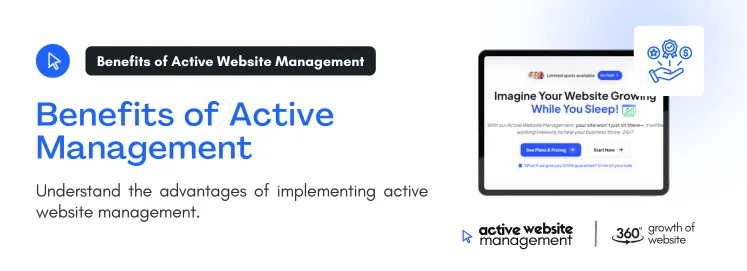
Active Website Management is not just about keeping your website online. It’s about ensuring that your site actively supports your business goals. Whether you want to generate more leads, sell more products, or improve brand awareness, your website is constantly optimized to achieve those results.
As your business grows and the market changes, your website needs to evolve. Active Website Management ensures that your website remains relevant and responsive to market trends, customer needs, and competitive pressures.
Unlike traditional website maintenance, which is reactive, Active Website Management focuses on growth. It’s about ensuring your site doesn’t just exist; it works hard for your business, helping you achieve more leads, conversions, and revenue.
Website maintenance, on the other hand, is a more basic service focused on keeping your website running. While it’s essential for any website to have regular maintenance, the scope is often limited to technical tasks that prevent the site from breaking down.
Don't Wait for Growth—Accelerate It with Active Website Management
A major part of website maintenance is ensuring that your site’s software, plugins, and themes are up to date to prevent security vulnerabilities. This is typically a monthly or quarterly task depending on the needs of the site.
Over time, websites experience issues such as broken links or coding bugs. Website maintenance is responsible for identifying and fixing these problems to ensure the site functions as expected.
Regular backups are part of website maintenance to ensure that if your site crashes or is hacked, you have a recent version to restore. This includes backing up content, databases, and other important files.
Website maintenance often includes monitoring the uptime of the website, ensuring that it remains live and accessible. If the site goes down, the maintenance team will work to bring it back online.
Website maintenance is crucial for protecting your site from potential security threats. By regularly updating the software and applying security patches, you can protect your website from hackers and malware.
Without maintenance, your website could experience bugs, slow performance, or even outages. Regular maintenance ensures that everything continues to run smoothly.
By handling minor problems before they escalate, website maintenance helps prevent bigger, more costly issues in the future.
Click here to learn about Top 10 Website Maintenance Tips Every Business Should Know
Now that we understand what Active Website Management and Website Maintenance entail, let’s explore the critical differences between the two. While both services are important, it’s clear that Active Website Management is a more comprehensive, growth-oriented solution.
Website maintenance primarily focuses on fixing what’s broken. If something goes wrong—like a plugin not working or the website crashing—maintenance steps in to resolve the issue. It’s reactive, meaning it waits for problems to arise before addressing them.
Active Website Management, on the other hand, is proactive. Rather than waiting for problems to occur, it continuously works to improve the site. Whether it’s enhancing SEO, improving design, or adding new content, Active Website Management looks ahead to ensure your website is always performing at its best.
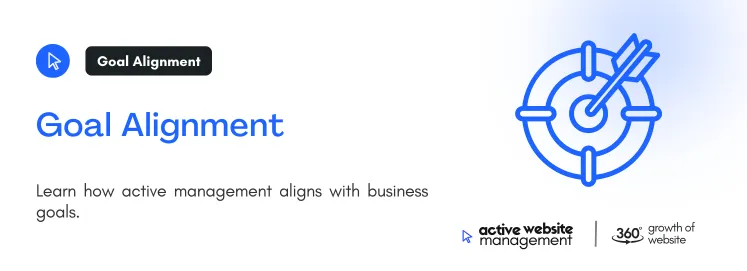
While website maintenance is essential, it typically doesn’t align with specific business goals. The focus is mainly on technical aspects like uptime, backups, and security patches. There’s little to no effort made to ensure that the website is contributing to business growth or lead generation.
Active Website Management is entirely goal-oriented. The service provider works closely with you to understand your business objectives, creating a strategy to ensure that the website contributes to your success. Whether it’s creating a new product launch page or improving SEO to generate leads, the focus is always on helping your business grow.
With website maintenance, updates typically occur on a set schedule—maybe monthly or quarterly. These updates are often related to security patches, backups, or bug fixes.
Active Website Management, by contrast, involves continuous, ongoing updates. Every month, improvements are made to SEO, content, design, and performance. These updates are not just technical; they are strategic, designed to help your site grow and adapt to changing market conditions.
Website maintenance ensures that the technical aspects of your website—such as loading speed, broken links, or security vulnerabilities—are taken care of. However, it often overlooks the user experience, focusing more on the backend than the frontend.
Active Website Management puts a strong emphasis on user experience. This means improving not only the speed and security of your site but also making sure it’s easy to navigate, mobile-friendly, and visually appealing. UX improvements are made with the end user in mind, ensuring that visitors have a seamless, enjoyable experience.
Website maintenance might involve some SEO work, but it’s usually basic—such as making sure meta tags are in place or checking for broken links that hurt SEO. Performance improvements might also be limited to ensuring the website is loading quickly.
Active Website Management includes ongoing, advanced SEO and performance optimization. This means that each month, new strategies are implemented to improve your rankings on search engines and ensure that your website loads as fast as possible. It also means continually tweaking your site to improve conversion rates and user engagement.
With traditional website maintenance, reporting is often minimal. You might get a notification that backups were successful or that security updates were applied, but there’s little data provided on how your website is performing.
With Active Website Management, detailed monthly reports are provided. These reports give you insights into website performance, traffic growth, SEO improvements, and conversion rates. The data is used to refine and adjust strategies to ensure continuous improvement.
The fundamental difference between Active Website Management and Website Maintenance lies in their approach to website care. Website maintenance is necessary for keeping the lights on, but it’s no longer enough for businesses that want to thrive in today’s competitive digital landscape.
Businesses today need their websites to do more than just exist. They need them to grow, attract leads, build trust, and generate revenue. This is why Active Website Management is essential. It ensures that your website is not only up-to-date but also a powerful tool for your business’s success.
Maintenance is reactive and often minimal, while Active Website Management is proactive, growth-focused, and aligned with your business goals. This makes Active Website Management not just a service, but a necessity for businesses that want to stay ahead of the competition and ensure long-term growth.
In conclusion, while both Active Website Management and Website Maintenance are important, they serve very different purposes. Website maintenance keeps your website running, while Active Website Management ensures that your website is always working for you—growing, evolving, and contributing to your business goals.
In today’s fast-moving digital world, businesses need more than just a functional website. They need a website that adapts, improves, and supports their growth. That’s why Active Website Management is the modern solution that clients truly need.

Be quick! Spots are almost gone for September. - Starts at ₹6666/month
Get started with AWM today and watch your website grow.
Our expert team is ready to help.
We respect your privacy. Unsubscribe anytime.
We respect your privacy. Unsubscribe anytime.

